Introduction: Arif Parwani is an Afghan-American author and engineering consultant. He was born in Afghanistan’s Helmand province, studied civil engineering in Germany, and moved to the United States in 1986. 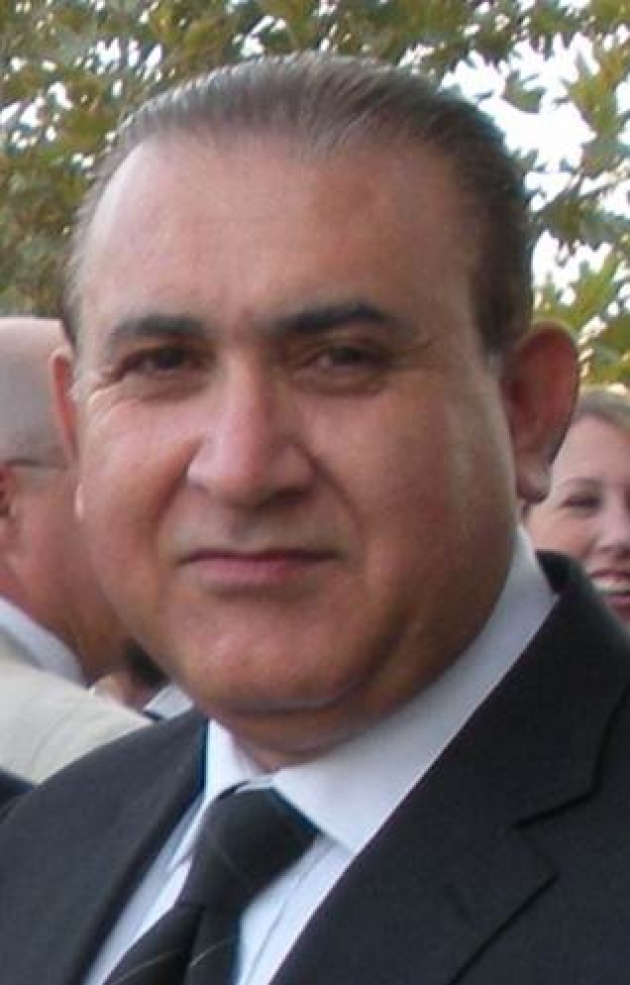
An engineer by trade, he continued to help Afghans as a private citizen. He returned to his homeland shortly after the fall of the Taliban to help rebuild the nation, and remained there for almost ten years working in various capacities for NATO, the United States, and the Afghan government.
He has served as a senior adviser to Afghanistan’s Ministry of Public Health; director of the Ministry of the Interior’s Afghanistan Stabilization Program; special adviser to the Inspector General for Afghan Reconstruction (SIGAR); and as a Ministerial Development adviser for the NATO Training Mission-Afghanistan. In 2006, he turned down an offer by President Karzai to become Mayor of Kabul.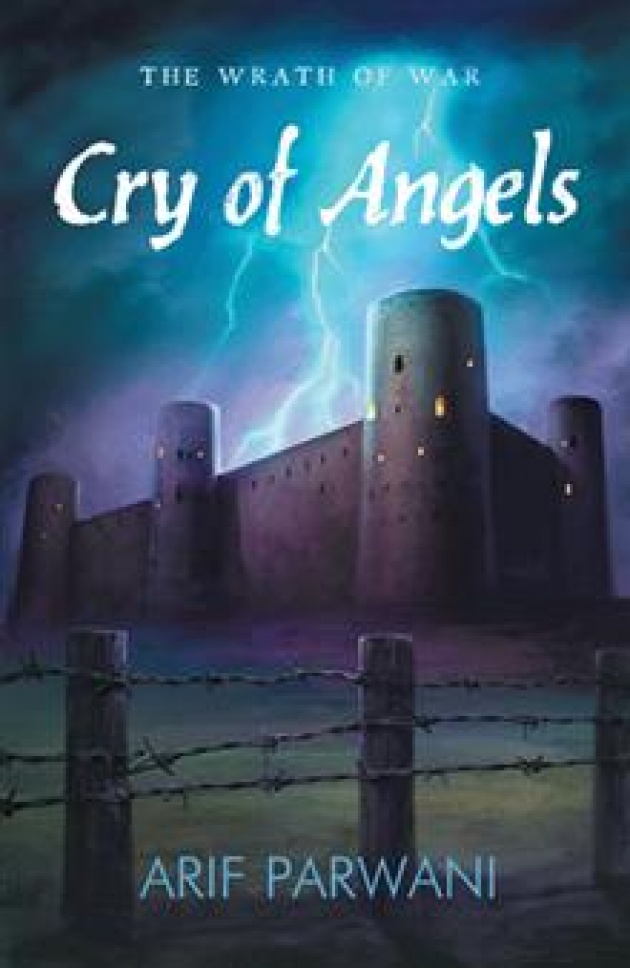
He also is the author of Cry of Angels, a novel based on the true story of an Afghan woman’s hopes and struggles against all odds in a country brutally damaged by politics, corruption and war.
Afghan-American television personality and author Dr. Farid Younos, host of NOOR-TV’s “The Dr. Younos Show,” has called Cry of Angels “the most powerful, chilling and stimulating story ever written about Afghanistan in the form of a novel.”
Arif Parwani speaks here with Edward Zellem, a U.S. Navy Captain and author of “Zarbul Masalha: 151 Afghan Dari Proverbs.”
-----
Film Annex: It’s a pleasure to speak with you, Arif. We really enjoyed Cry of Angels. It’s a very powerful book. Please tell us a little more about your background.
Arif Parwani: Thanks very much, you’re very kind. Zenda bosheyn زنده باشین (long life to you). Please allow me also to congratulate you on your beautiful compendium of Afghan proverbs, Zarbul Masalha. And I‘d like to congratulate Film Annex on its very pragmatic and innovative approaches toward Afghan literacy and women’s empowerment through the Afghan Development Project. I am fascinated by both your initiatives, and wish both of you even more success in your endeavors.
I was in my senior year of engineering college at Kabul University when Soviet troops invaded Afghanistan in 1979, and I escaped my country for Pakistan in a matter of days as a refugee. During my three months’ sojourn in Peshawar, I worked with the United Nations Development Program (UNDP) on shelter and literacy projects for other Afghan refugees before leaving for Germany to continue my education. It was 1986 when I finally joined my family in California. They left Afghanistan after me.
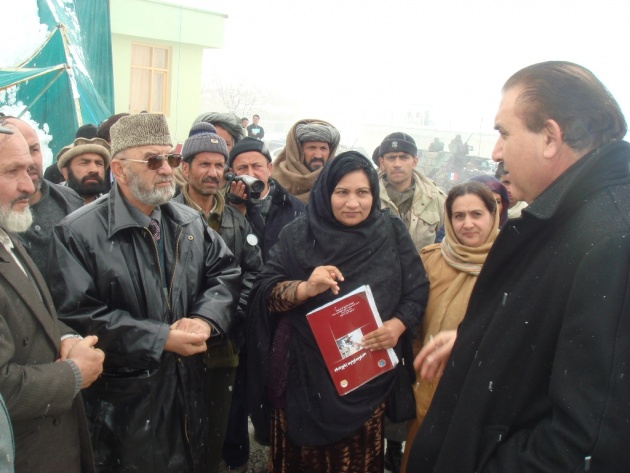
Arif Parwani meets with Afghan villagers at a development site
Prior to the fall of the Taliban regime in 2001, I made several extended trips to visit Afghan refugee camps in Pakistan. My first trip was a survey visit in 1985 during the midst of the anti-Soviet jihad era. I discovered at that time that proactively helping Afghan refugees was rather complicated for Afghan volunteers who were not affiliated with one of the seven major mujahideen parties. However, the trip was very productive in the sense that I documented my observations and personal reservations about the dominating sociopolitical theology at the time, which has endured in some places until even today. This outlook has changed the lives of Afghans for the worse in the past three decades, especially the lives of women.
I visited Afghanistan frequently after the fall of the Taliban regime, at first for shorter-term consulting efforts. Then I remained in Afghanistan full-time from 2003 to 2012 to work on development-related initiatives. As you mentioned in the introduction, I worked on a variety of governance, reconstruction and capacity building projects during that time.
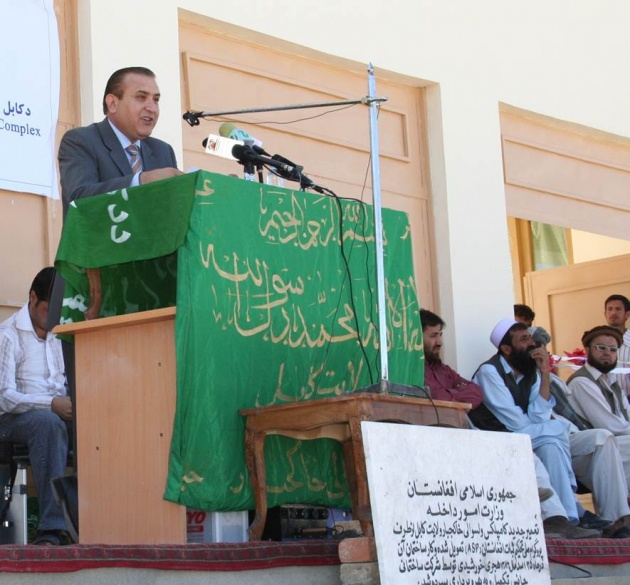
Opening a new District Center complex in the village of Khak-e Jabbar, Kabul Province
FA: Please tell us about your “Peace Through Education” initiative and what you saw during your 2001 trip to Peshawar.
AP: I went to Peshawar in March 2001, still during the Taliban rule in Afghanistan, and I visited many Afghan refugee schools there. I was shocked to see that the school curricula in most of those refugee schools, mostly orphanages, were promoting the culture of guns and violence in the name of jihad. It was then that I decided to establish and register a NGO in California called “Peace Through Education.” Our motto was “Inspiration in the absence of education is a recipe for chaos.” My purpose was to help promote modern school curricula tailored to the traditions and realities of the refugee culture at the time. It was not an easy task for an engineer to engage in projects of this nature, but thanks to Afghan volunteers in Pakistan and other organizations in the United States, I was able to identify the challenges and to come up with a mitigation plan. But as I was ready to move forward with my plan, the 9/11 tragedy happened.
FA: Fascinating. Educating young children to promote jihad with guns and violence reminds me of the well-known Afghan Proverb, “Tegh-raa ba dast-e daywaanah daadan.” تیغ را به دست دیوانه دادن (To put a knife in the hand of a maniac.). What happened then?
AP: Despite the post-9/11 security restrictions and political obstacles, I was able to represent Peace Through Education in the first post-Taliban reconstruction conference in Islamabad in November 2001, even as large pockets of Taliban were still fighting in southern and southwestern Afghanistan. With the newly established Afghan Transitional Government, the Afghan refugee repatriation started very soon. Due to the high demand for engineering and construction skills, I wanted to help with the reconstruction of schools and clinics through USAID projects across the country. I was very happy to plant the seeds for Peace Through Education at the Peshawar conference in November 2001. Very soon, a similar program and locally managed NGO with the name “Peace Through Education” emerged there. It is still actively involved in adult literacy in remote areas and underserved villages across Afghanistan.
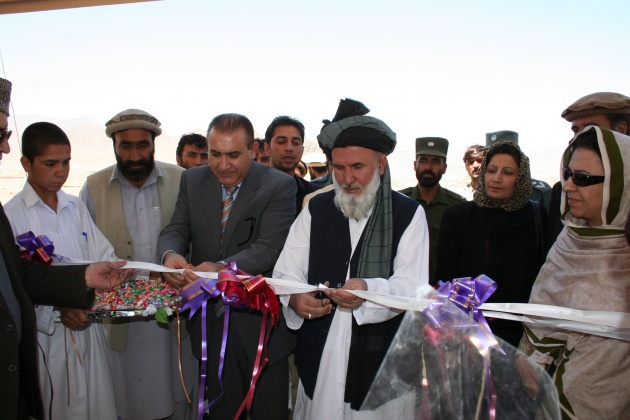
Arif Parwani and the Governor of Kabul cut the ribbon at a new facility
FA: Was “Peace Through Education” your last literacy project?
AP: After the successful completion of school and clinic reconstruction programs, I was fortunate enough to have another opportunity to help Afghans in the area of adult literacy, vocational training, and institution building as director of the Afghan Stabilization Program under the Ministry of the Interior. This started as a foreign-sponsored, donor-funded initiative, and was one of the national priority programs that promoted stability and good governance through infrastructure development and capacity building. We had a presence in all 34 provinces and 364 districts. It ultimately transitioned in 2008 to become the Independent Directorate of Local Governance (IDLG) and a Cabinet-level organization of the Government of Afghanistan.
FA: You have a diverse portfolio of experience in rebuilding Afghanistan starting in 2001. How do you assess the efforts of the international community and Afghans themselves in improving Afghans’ lives, especially the lives of women and youth, in the post-Taliban era?
AP: We should not forget that Afghans fought the Soviet superpower for more than a decade, followed by a decade of tragic civil war, and the draconian rule of the Taliban that barred women from working outside their homes and closed girls’ schools. And let’s also bear in mind that Afghanistan is currently in a state of war. When the world gathered in Bonn in December 2001 to draw a roadmap for the reconstruction of Afghanistan, not only was the infrastructure of the country totally destroyed, but the social, political and cultural state of Afghans was suffering from incredible damage. Thus, Afghans and the international community had a very difficult road ahead. Despite all these challenges, the achievements in the state of women’s lives and freedom of expression is enormous in comparison to the post-Soviet mujahideen administration and the Taliban era in the 1990s.
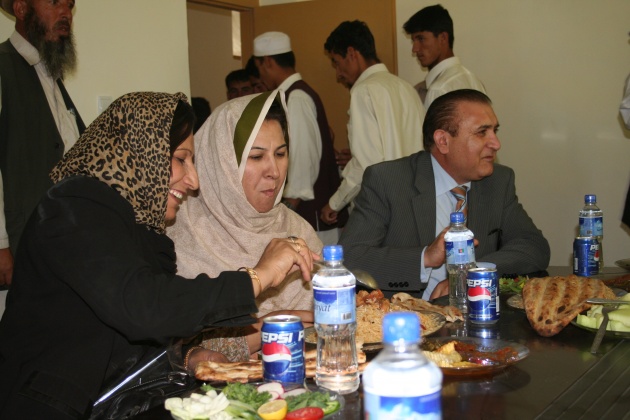
At lunch with female members of the Afghan Parliament
I still remember the thrill I felt when I inaugurated the first-ever women’s rights and sexual harassment seminar in Afghanistan for Provincial civil servants. It was a joyful moment to help inaugurate dozens of vocational training and computer literacy projects, and provide internet access and TVs in areas that had been controlled by the Taliban. Just because we still hear tragic stories of rape, torture and even honor killings of Afghan women, it doesn’t mean that women were better off in the 1990s. The truth is that these facts were not being reported, and the world largely had left helpless Afghans to deal with their problems on their own. However, we could have had better results had we taken more culturally appropriate strategies and coordinated our efforts better among the many NGOs engaged in these fields.
FA: Can you elaborate on the “culturally appropriate strategies” that you believe could have improved the situation?
AP: I am confident that you know from your experience (and your collection of wonderful Afghan Proverbs supports this rationale) that many Afghan tribes still live in a patriarchal society, and surprisingly the women of these cultural groups abide by their cultural codes of conduct and accept to certain degrees a male-dominated household. This is true even though these women have been productive members of Afghan society throughout history. They have worked side-by-side with men in the fields, and have even participated in the wars against outside invaders – even without the so-called “blood related” members of their families. But instead of trying to repeal these long standing cultural codes, there are traditional ways to work within the culture to improve this situation and legacy.
We can learn much from the lessons of the various failed eras of Afghan democracy and secular constitutions in the past eight decades, starting with women’s emancipation under the reformist King Amanullah in the early 1920s. For example, one good method would be to better leverage the power of the tribal elders and religious clerics, consistent with cultural awareness and the teachings of Quran, to promote a relatively liberal standard of education and working environment for Afghan women. This can help overcome the oppression of women that is advocated by radical groups such as the Taliban.
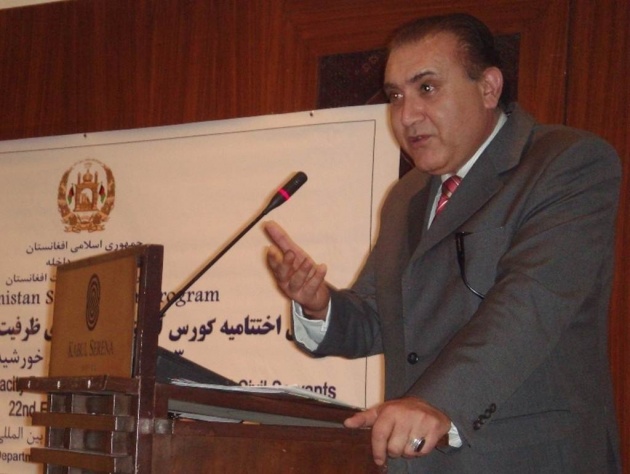
Speaking at a Provincial reconstruction seminar
FA: What do you think of the role of social media in today’s Afghanistan?
AP: I’d like to cite an Afghan Proverb from your book Zarbul Masalha (“Proverbs” in Dari), a Proverb which is found in both the Dari and Pashto languages. “Aaftaab ba doo angusht pen-han na-mey-shawad.” (The sun cannot be hidden by two fingers). آفتاب به دو انگشت پنهان نمیشود
This means that the truth cannot be hidden. Thanks to the internet and social media, the world community has turned to a small village. In this context, social media is the Sun that can relay the voice of freedom and social justice, and also the true message of the Quran. Social media can be very instrumental in teaching the world about the rich history and glorious civilization of the Afghans, and female heroines like Malalai of Maiwand, Rabia Balkhi, Nahid Sahed, and Nazo Tokhi.
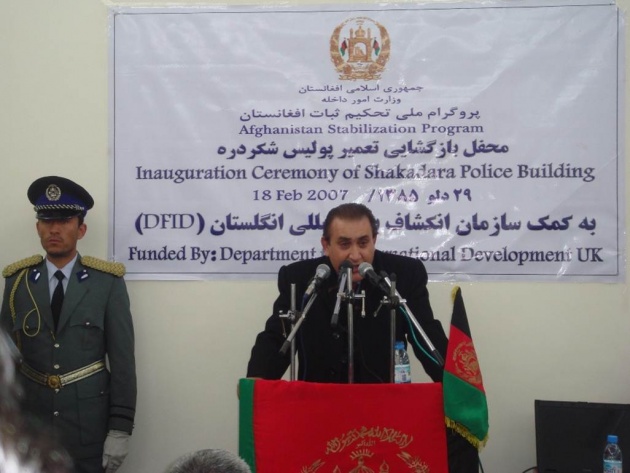
Opening a new police building in Shakardara
FA: You’ve written and published Cry of Angels, a novel of war fiction with a central female character. Please tell us what motivated you to write a book on the plight of Afghan women. 
AP: Cry of Angels is based on my decades of research and interviews that I began conducting in refugee camps in Pakistan in the 1980s, and continued in Afghanistan through 2012. The book documents many real-life people and events, but was written as fiction for technical, cultural and privacy reasons. Some of the characters and places were fictionalized. The purpose of Cry of Angels is to remind the world one more time to look back and see what Afghans, and especially women, went through after the Soviet troops left Afghanistan.
FA: How do you see the future of women and young people in post-2014 Afghanistan, after most NATO and foreign forces withdraw?
AP: The future of women in Afghanistan will depend on good governance, which in turn depends on the state of security and the economy in post-2014 Afghanistan. Security and the economy are two sides of a coin. The mint that makes the coin must design, hammer and shape a political framework tailored to the culture, needs and realities of today’s Afghans and Afghanistan. History tells us that that you cannot govern today’s Afghanistan with tomorrow’s government. There are traditional Afghan ways of developing good governance and democracy that can sustain security and economic development. 
Medieval Persian poet Saadi Shirazi
I believe that Afghan women and youth ultimately will succeed no matter what. But a political settlement and a legitimate form of government that can be accepted by the majority of Afghans will pave the road ahead, and prevent the positive achievements of the last decade from becoming lost or otherwise compromised.
FA: What is your message for the Afghan people?
AP: As the famous Persian poet Saadi (1184-1283) wrote, “Individuals are the body parts of one main body (Mankind) and grew from one stem; if one part suffers from pain, the whole body will feel pain.” My message is not only for Afghans, but for the friends of Afghanistan as well. Optimism is good; as another Afghan proverb says, “Doon-ya baa omeed zenda ast.” (The world is alive with hope).
دنیا با امید زنده است
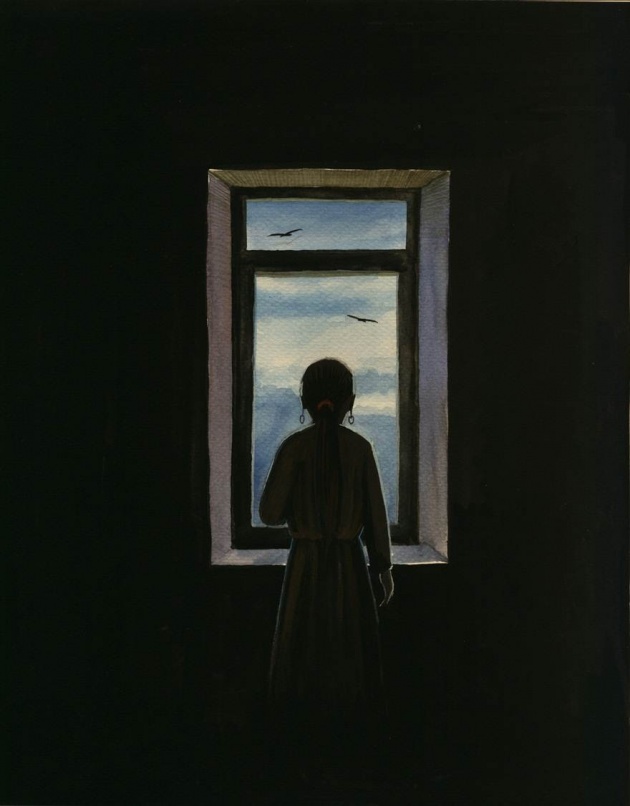
"The world is alive with hope." (original art from Zarbul Masalha)
But we also should look back at the days before the Soviet withdrawal, and learn from the story of an educated young Afghan woman and her sisters in Cry of Angels. Another Afghan proverb from your great book Zarbul Masalha also applies: “Aazmuda-ra aazmudan khatast.” آزموده را آزمودن خطاست (Testing of a tested one is wrong). Trying something that you have already tried, but has failed, is wrong.
I would like to conclude with the motto behind the “Peace Through Education” program in Peshawar in 2001: “Inspiration in absence of education is a recipe for chaos.” A good example is found in the recent U.S. concert tour by the Afghan Youth Orchestra. These young Afghan musicians send messages of peace and hope by pressing their fingers against musical instruments.
On the other hand, we have many young Afghans sent by the Taliban on suicide missions. They are deprived of education, but inspired by radical ideas. The first group presses their fingers on musical instruments to send messages of peace and hope. The second group presses their fingers to detonate suicide jackets. We must encourage and support the first group however we can, or there will be chaos again.
Twitter: @afghansayings
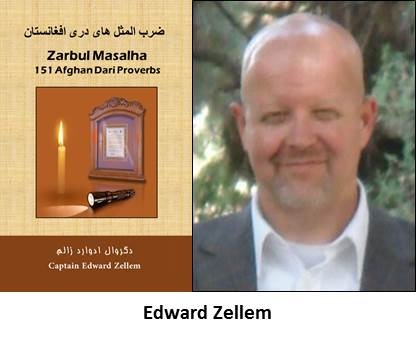 More of Edward Zellem's interviews with Afghan celebrities and thought leaders are coming soon.
More of Edward Zellem's interviews with Afghan celebrities and thought leaders are coming soon.
To be notified of new interviews, updates and articles, please visit here and click the green "Subscribe" button.



